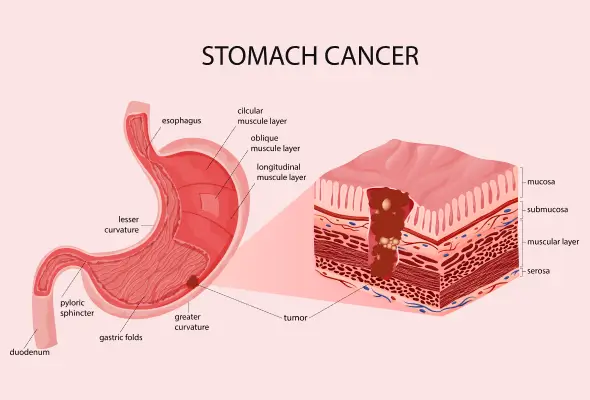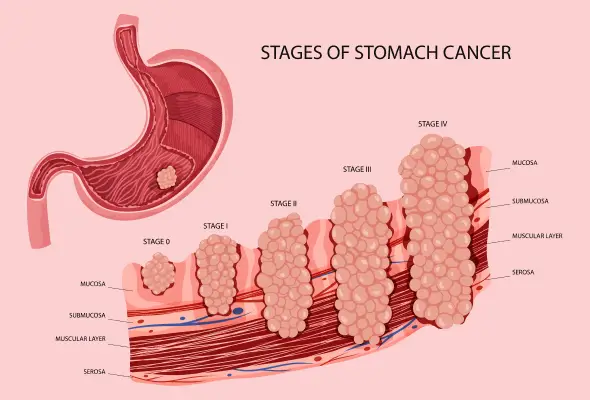-
Doctors
-
Specialities & Treatments
Centre of Excellence
Specialties
Treatments and Procedures
Hospitals & Directions HyderabadCARE Hospitals, Banjara Hills CARE Outpatient Centre, Banjara Hills CARE Hospitals, HITEC City CARE Hospitals, Nampally Gurunanak CARE Hospitals, Musheerabad CARE Hospitals Outpatient Centre, HITEC City CARE Hospitals, Malakpet
HyderabadCARE Hospitals, Banjara Hills CARE Outpatient Centre, Banjara Hills CARE Hospitals, HITEC City CARE Hospitals, Nampally Gurunanak CARE Hospitals, Musheerabad CARE Hospitals Outpatient Centre, HITEC City CARE Hospitals, Malakpet Raipur
Raipur
 Bhubaneswar
Bhubaneswar Visakhapatnam
Visakhapatnam
 Nagpur
Nagpur
 Indore
Indore
 Chh. Sambhajinagar
Chh. SambhajinagarClinics & Medical Centers
Book an AppointmentContact Us
Online Lab Reports
Book an Appointment
Consult Super-Specialist Doctors at CARE Hospitals

Stomach Cancer
Symptom, Causes, Diagnosis and Treatment
Stomach Cancer

What is Stomach Cancer?
The stomach is a J-shaped organ in the gastrointestinal tract that digests food. Gastric stomach cancer refers to the abnormal growth of malignant cells in the stomach's lining. It typically starts in the innermost layer, known as the mucosa, and can spread to deeper layers and other parts of the stomach or adjacent organs if left untreated. Stomach cancer can be asymptomatic in its early stages, making it challenging to detect. However, as the disease advances, symptoms may start appearing.
Types of Stomach Cancer
Stomach cancer is classified according to the type of cell your cancer began, such as:
- Adenocarcinoma stomach cancer: Adenocarcinoma is the most common type of gastric stomach cancer, comprising approximately 90-95% of all cases. It develops from the cells that form the mucosa and often begins in the glandular cells, producing stomach acid and digestive enzymes. Adenocarcinoma can be further classified into intestinal and diffuse types, each with distinct characteristics and prognosis.
- Lymphoma: Lymphoma arises from the lymphatic tissue in the stomach and can affect individuals of any age.
- Gastrointestinal stromal tumours (GISTs): This rare type of gastric tumour originates in the connective tissues of the stomach.
- Carcinoid tumour: These rare neuroendocrine tumours emerge from the hormone-producing cells.
- Squamous cell carcinoma: This rare stomach cancer originates in the squamous cells lining the upper part of the stomach.

Signs and Symptoms of Stomach Cancer
Detection in the early stages of stomach cancer is challenging, as it often presents with subtle or nonspecific symptoms. However, recognising the warning signs can be crucial in timely diagnosis and treatment. Some common symptoms include:
- Persistent abdominal pain or discomfort
- Unintentional weight loss
- Loss of appetite and early satiety
- Nausea and vomiting
- Difficulty swallowing (dysphagia)
- Blood in the stool that appears as black, tarry stools (melena)
- Fatigue and weakness
- Jaundice (yellowing of the skin and eyes)
It is important to note that these symptoms may vary and depend on the cancer stage and the individual's overall health.
Causes of Stomach Cancer
The exact reason for stomach cancer remains unknown, but certain factors are potential contributors to its development, such as:
- One of the primary culprits is a bacterial infection called Helicobacter pylori (H. pylori), which can cause inflammation and increase the risk of stomach cancer.
- Long-term inflammation of the stomach lining, known as chronic gastritis, has been linked to an increased likelihood of developing gastric cancer.
- Exposure to specific occupational hazards, such as asbestos and coal dust, also increases the possibility of stomach cancer.
- Age: Stomach cancer is more common in individuals over the age of 55.
- Gender: Men are more prone to stomach cancer than women.
- Family history: Having a first-degree relative (parent or sibling) with stomach cancer increases the risk.
- Ethnicity: Certain populations, such as Asians, Hispanics, and African Americans, have a higher possibility of stomach cancer.
- Pernicious anaemia: This condition, which causes a decrease in red blood cells, is associated with an increased risk of stomach cancer.
- Smoking: Tobacco smoking is a substantial risk factor for stomach cancer.
- Diet: Consuming a diet high in salted, smoked, pickled, or salted foods can elevate the risk.
Understanding these risk factors helps people make informed choices to reduce their chances of developing stomach cancer.
Complications
Stomach cancer can lead to several complications, mainly if not diagnosed and treated promptly. These complications may include:
- Perforation: The cancerous cells can erode through the stomach wall, leading to perforation and subsequent infection.
- Bleeding: As the tumour grows, it may invade blood vessels, causing gastrointestinal bleeding.
- Obstruction: The tumour can obstruct the passage of food through the stomach, leading to digestive problems.
- Metastasis: Stomach cancer can spread to nearby lymph nodes, liver, lungs, and other distant organs, causing further complications.
Diagnosis
Diagnosing stomach cancer typically involves the following steps:
- Medical history review: The healthcare provider will review the person's medical history and conduct a physical assessment to evaluate stomach cancer symptoms and signs.
- Imaging tests: Techniques such as abdominal ultrasound, Magnetic Resonance Imaging (MRI), computed tomography (CT) scan, and positron emission tomography (PET) scan can help visualise the stomach and detect any abnormalities.
- Endoscopy: This procedure allows the doctor to assess the stomach lining and other parts and obtain tissue samples for biopsy.
- Biopsy: A small tissue sample is taken during endoscopy and analysed under a microscope to confirm the presence of cancer cells.
- Blood tests: Blood analysis detects specific blood markers, like carcinoembryonic antigen (CEA) and carbohydrate antigen 19-9 (CA 19-9), which may elevate in individuals with stomach cancer.
Treatment of Stomach Cancer
The cure for stomach cancer depends on several factors, including the stage of the tumour, the individual's overall health, and personal preferences. The primary treatment options include:
- Surgery: Surgical removal of the tumour and surrounding lymph nodes is often the first-line treatment for localised stomach cancer.
- Chemotherapy for stomach cancer: Depending on the cancer stage, your doctor can prescribe chemotherapy for stomach cancer. Systemic administration of anti-cancer drugs helps destroy cancer cells, shrink tumours before or after surgery, or improve symptoms and prolong survival in advanced cases.
- Radiation therapy: High-energy beams target the cancerous cells to destroy them or alleviate symptoms like pain and bleeding.
- Targeted therapy: This treatment approach focuses on specific molecular targets in cancer cells to inhibit their growth and division.
- A multidisciplinary team of medical providers, including surgeons, medical oncologists, radiation oncologists, and other specialists, will tailor the treatment plan.
Prevention
While there are no foolproof stomach cancer prevention methods, certain lifestyle modifications and risk-reduction strategies can help minimise the chances of developing the disease. Consider the following preventive measures:
- Helicobacter pylori (H. pylori) eradication: If an H. pylori infection is discovered, seeking appropriate treatment under medical supervision is crucial.
- Balanced diet: Incorporate a variety of antioxidant-rich fruits, seasonal vegetables, whole grains, and lean proteins into your diet while limiting the consumption of processed and preserved foods.
- Tobacco cessation: Quitting smoking can significantly reduce the risk of developing stomach cancer.
- Limit alcohol consumption: Excessive alcohol intake increases your risk of stomach cancer, so consuming alcohol in moderation or avoiding it altogether is advisable.
- Maintain a healthy weight: Engage in regular physical activity and adopt a balanced lifestyle to maintain a healthy weight, as being overweight may increase the risk of stomach cancer.
When to See a Doctor
It is essential to consult a doctor if you experience any persistent or concerning symptoms, such as:
- Chronic or persistent pain in the upper abdomen
- Severe nausea and vomiting
- Blood in the stool or vomit
- Chronic fatigue or weakness
Although these symptoms may not necessarily indicate stomach cancer, they should be evaluated to rule out any underlying medical conditions.
Conclusion
Stomach or gastric cancer is a silent threat, as it does not have signs or symptoms in its early stage. Understanding its symptoms, risk factors, and preventive measures is vital for early detection and optimal treatment outcomes. If you or someone you know is experiencing persistent symptoms associated with stomach cancer, consult with your doctor.
FAQ's
1. Is gastric cancer curable?
The curability of gastric cancer depends on various factors, such as the stage of cancer, the person's overall health, and the chosen treatment approach. Early-stage gastric cancer has a higher chance of being cured compared to advanced-stage cancer. Therefore, consult a healthcare professional to determine the best treatment plan based on the specific circumstances.
2. What is one of the first signs of stomach cancer?
One of the first signs of stomach cancer can be persistent abdominal pain or discomfort. However, it is essential to note that these symptoms may vary among individuals, and the presence of abdominal pain does not necessarily indicate stomach cancer.
3. How painful is stomach cancer?
The pain associated with stomach cancer can vary and depend on the stage of the disease and individual tolerance. In the early stomach cancer stages, the condition may not cause noticeable pain, while advanced-stage cancer can lead to more severe abdominal pain and discomfort. Effective pain management strategies are available to help diminish discomfort and improve the quality of life for individuals with stomach cancer.
4. Can a CT scan detect stomach cancer?
A CT scan can be a valuable measure in detecting stomach cancer. It provides detailed images of the stomach and surrounding structures, helping healthcare professionals identify abnormalities or tumours. However, a definitive stomach cancer diagnosis usually requires a combination of imaging tests, endoscopy, and tissue biopsy to confirm the presence of cancer cells.
5. Does a stomach ulcer cause cancer?
While stomach ulcers do not directly cause cancer, the factors associated with them, such as chronic inflammation and H. pylori infection, can increase a person's risk of developing stomach cancer.

Still Have a Question?



